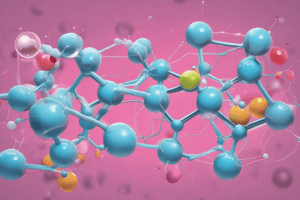Podcast
Questions and Answers
Why are hydrogen bonds considered a special class of dipole-dipole interactions? (Select all that apply)
Why are hydrogen bonds considered a special class of dipole-dipole interactions? (Select all that apply)
- These interactions are with polar molecules but are stronger than dipole-dipole interactions. (correct)
- These interactions are between polar molecules but are weaker than normal dipole-dipole interactions.
- They are observed with all molecules that contain only hydrogen and fluorine.
- These interactions only occur with organic molecules.
- These interactions only occur if hydrogen is bonded to nitrogen, oxygen, and fluorine. (correct)
- These interactions account for the higher melting and boiling points observed for certain molecules such as water. (correct)
- They are observed with all molecules that contain hydrogen. (correct)
Rank the two molecules by increasing boiling point if one has a boiling point of 57°C and the other 84°C.
Rank the two molecules by increasing boiling point if one has a boiling point of 57°C and the other 84°C.
Molecule A, Molecule B
Which of the following is the best explanation for the difference in boiling point between the two molecules? Choose one:
Which of the following is the best explanation for the difference in boiling point between the two molecules? Choose one:
- The molar mass of Molecule A is greater than the molar mass of Molecule B.
- Molecule A is a polar molecule, while Molecule B is nonpolar.
- The molar mass of Molecule B is greater than the molar mass of Molecule A. (correct)
- Molecule B is a polar molecule, while Molecule A is nonpolar. (correct)
In each of the following pairs of compounds, which compound is likely to be more soluble in CCl4?
In each of the following pairs of compounds, which compound is likely to be more soluble in CCl4?
Which of these substances is the most soluble in water?
Which of these substances is the most soluble in water?
Flashcards are hidden until you start studying
Study Notes
Hydrogen Bonds and Dipole-Dipole Interactions
- Hydrogen bonds are a unique class of dipole-dipole interactions due to their strength compared to typical dipole-dipole forces.
- These bonds occur specifically when hydrogen is covalently bonded to highly electronegative atoms like nitrogen, oxygen, or fluorine.
- Hydrogen bonding contributes to the higher melting and boiling points of substances such as water, which is crucial for biological processes.
Boiling Points of Molecules
- The comparison of boiling points reveals that one molecule has a normal boiling point of 57°C, while the other has 84°C.
- Molecules can be ranked based on their boiling points, with the lower boiling point molecule (57°C) placed before the higher boiling point molecule (84°C).
Explanation for Differences in Boiling Points
- The difference in boiling points can be attributed to molecular polarity and mass.
- A polar molecule (Molecule B) tends to have a higher boiling point than a nonpolar molecule (Molecule A).
- Molar mass also plays a significant role; a greater molar mass usually leads to higher boiling points.
Solubility in CCl4
- Solubility in nonpolar solvents like CCl4 favors nonpolar compounds.
- Among given pairs, Br2 is more soluble in CCl4 compared to NaBr, as nonpolar substances dissolve better in nonpolar solvents.
- For the pairs C2H5OH vs. CH3OCH3, CS2 vs. KOH, nonpolar molecules generally exhibit higher solubility in CCl4.
Solubility in Water
- The solubility of organic compounds in water can vary significantly.
- C4H9NH2 is more soluble in water compared to C6H13Cl, C8H17Br, and C10H21I due to the presence of the amine group which enhances solubility in polar solvents.
Summary of Chemical Properties
- Understanding the interactions (hydrogen bonds vs. dipole-dipole), boiling points, and solubilities of various compounds is crucial for predicting behavior in different chemical environments.
Studying That Suits You
Use AI to generate personalized quizzes and flashcards to suit your learning preferences.




